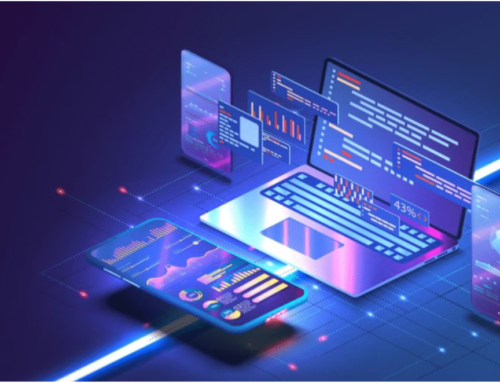In today’s fast-paced global economy, logistics plays a crucial role in ensuring that goods move efficiently from manufacturers to consumers. However, managing supply chains has become increasingly complex, requiring real-time visibility, automation, and smart analytics to stay competitive.
This is where mobile applications for logistics management come in. From fleet tracking and automated route optimization to AI-driven predictive analytics, mobile apps are revolutionizing how logistics companies operate.
Over 90% of logistics companies are adopting digital transformation strategies (Source: McKinsey). The integration of real-time tracking in logistics has become a game-changer. It enhances transparency, reduces costs, and ensures on-time deliveries, ultimately improving customer satisfaction.
So, how exactly are mobile logistics apps reshaping the industry? Let’s explore the impact of real-time tracking and other advanced features that are setting new standards in supply chain management.
The Role of Mobile Apps in Modern Logistics
How Mobile Apps Are Revolutionizing Logistics Management
Logistics operations involve multiple moving parts—shipment tracking, fleet management, warehouse monitoring, order fulfillment, and customer communication. Traditional methods relying on manual data entry and fragmented systems often lead to delays, inefficiencies, and revenue loss.
Mobile logistics apps bridge this gap by:
- Providing real-time tracking for shipments and vehicles.
- Offering automated route optimization to minimize fuel costs and delays.
- Enabling instant communication between drivers, warehouses, and customers.
- Enhancing inventory management with cloud-based solutions.
Case Study: How Logistics Giants Leverage Mobile Apps
Companies like Amazon, FedEx, and DHL have integrated smart logistics apps with AI-driven tracking systems to optimize delivery schedules and reduce turnaround times.
For example, DHL’s On-Demand Delivery app provides customers with real-time shipment tracking and estimated delivery times, improving efficiency and reducing missed deliveries by 30%.
The Growing Need for Logistics Mobile Apps
With the logistics industry projected to reach $15.5 trillion by 2024 (Source: Research and Markets), businesses that fail to adopt digital solutions risk falling behind.
Companies looking for custom logistics app development should partner with experienced firms like LABAAP, a leading mobile app development company in Puerto Rico, to create scalable, feature-rich solutions tailored to their needs.
Real-Time Tracking: A Game Changer for Logistics
What Is Real-Time Tracking?
Real-time tracking in logistics refers to the continuous monitoring of shipments, vehicles, and inventory through GPS, IoT, and AI-powered analytics. It enables logistics managers and customers to track deliveries with pinpoint accuracy.
Key Benefits of Real-Time Tracking in Logistics
- Enhanced Visibility: Businesses can monitor fleet movement, temperature-sensitive goods, and inventory in real-time.
- Improved ETA Accuracy: AI-powered tracking predicts accurate arrival times, reducing delays and enhancing customer satisfaction.
- Better Security: With geofencing and route tracking, logistics firms can prevent cargo theft and reduce unauthorized deviations.
- Cost Savings: Companies using route optimization and automated scheduling save 15-20% on fuel and operational costs (Source: Supply Chain Digital).
UPS and Real-Time Tracking
UPS has reduced late deliveries by 26% using real-time tracking combined with AI-powered route optimization. This system helps UPS drivers avoid traffic congestion and improve delivery efficiency without unnecessary detours.
Must-Have Features in a Logistics Tracking App
The effectiveness of logistics mobile apps lies in their features. These apps provide a seamless, technology-driven approach to managing supply chains, tracking shipments, and ensuring operational efficiency. Below are some of the must-have features that every logistics tracking app should include:
1. Live GPS Tracking
GPS tracking is a core feature of logistics mobile apps, providing businesses and customers with accurate, real-time location tracking of shipments and vehicles.
How It Works:
- Uses satellite and cellular networks to track vehicle movement.
- Provides live updates on estimated delivery times (ETAs).
- Enables route monitoring and optimization to avoid delays.
Benefits for Businesses & Customers:
- Ensures real-time visibility of fleet movements.
- Helps logistics managers detect route deviations and prevent theft.
- Improves fleet performance by analyzing driver behavior and delivery times.
Example: Companies like UPS and FedEx leverage GPS tracking to monitor millions of deliveries daily, reducing delays by up to 26%.
2. Geofencing Technology
Geofencing is an advanced location-based feature that enables businesses to set virtual geographic boundaries for their vehicles and shipments.
How It Works:
- When a vehicle enters or leaves a predefined area, the system automatically triggers alerts.
- Helps in route optimization by preventing unauthorized detours.
- Supports anti-theft mechanisms by locking shipments in case of deviation from assigned routes.
Benefits:
- Reduces fuel consumption and optimizes routes for timely deliveries.
- Enhances cargo security by preventing unauthorized stops or theft.
- Improves customer experience by notifying them about delivery status based on geofence triggers.
Example: Amazon’s logistics system employs geofencing to automate delivery scheduling, ensuring faster and more reliable last-mile deliveries.
3. Automated Notifications
A logistics tracking app must have an automated notification system to streamline communication between all stakeholders.
How It Works:
- Sends real-time alerts about shipment status (dispatched, in transit, delayed, delivered).
- Notifies customers and business partners about expected delivery times.
- Alerts logistics managers in case of delays, route changes, or potential issues.
Benefits:
- Enhances customer satisfaction by providing timely updates.
- Reduces manual follow-ups and calls between drivers and logistics managers.
- Increases transparency in the supply chain process.
Example: DHL’s On-Demand Delivery App uses automated alerts to notify customers about package status, reducing customer complaints by 30%.
4. AI-Powered Predictive Analytics
AI-driven predictive analytics is one of the most powerful features in modern logistics mobile apps, helping businesses optimize their supply chain operations.
How It Works:
- Uses historical and real-time data to predict future logistics demands.
- Identifies potential delays and recommends optimized delivery schedules.
- Helps in inventory forecasting to prevent stockouts or overstocking.
Benefits:
- Improves demand forecasting, reducing inventory holding costs.
- Enables better decision-making for fleet management and scheduling.
- Enhances customer satisfaction by reducing shipment delays.
Example: Uber Freight uses AI-powered analytics to predict delivery delays and optimize routes, reducing transit times by 15%.
5. Cloud-Based Data Storage
Cloud technology ensures that logistics businesses have seamless access to their data anytime, anywhere.
How It Works:
- Stores shipment records, fleet logs, and warehouse inventories on a secure cloud platform.
- Allows real-time collaboration between drivers, warehouse managers, and logistics teams.
- Ensures scalability, accommodating business growth without heavy IT infrastructure investments.
Benefits:
- Enhances data security with encrypted cloud storage.
- Reduces IT infrastructure costs by eliminating on-premise servers.
- Enables real-time data access across multiple devices and locations.
Example: DHL and Maersk use cloud-based logistics solutions to track millions of shipments worldwide, ensuring seamless supply chain management.
Tech Leaders Leveraging AI in Logistics Apps
Several innovative companies are using AI-powered mobile applications to transform logistics operations.
Notable Examples:
- Uber Freight: Uses AI-driven analytics to match carriers with shippers, reducing empty miles and improving efficiency.
- Convoy: Implements machine learning algorithms to optimize truckload shipments, helping businesses cut costs.
- Amazon Logistics: Employs AI-powered route optimization for faster, more accurate deliveries.
AI-driven logistics apps are already improving efficiency by 30%, and this number is expected to grow as technology advances.
Advantages of Mobile Apps for Logistics Management
For Logistics Companies
- Higher operational efficiency through automation.
- Lower costs with AI-driven fuel and route optimization.
- Regulatory compliance with automated reports.
For Customers
- Real-time shipment tracking improves satisfaction.
- Accurate ETAs prevent missed deliveries.
- Better communication between buyers and sellers.
How DHL Improved Logistics Efficiency
With DHL’s AI-powered logistics tracking app, customer complaints decreased by 35%, and on-time deliveries improved significantly.
Challenges and Solutions in Implementing Real-Time Tracking
Challenges Faced by Logistics Firms
- High Initial Investment – Implementing IoT-powered tracking systems, GPS-enabled devices, and AI-driven analytics requires substantial upfront costs, making it a significant financial challenge for small and mid-sized logistics businesses.
- Data Security Risks – Since logistics mobile apps process highly sensitive information, such as fleet locations, customer details, and financial transactions, they become attractive targets for cybercriminals, data breaches, and hacking attempts, posing a serious threat to business operations.
- Integration Issues – Many logistics firms rely on outdated legacy systems, which are incompatible with modern mobile applications, cloud solutions, and IoT tracking devices, leading to operational disruptions and inefficiencies during digital transformation.
Solutions for Logistics Businesses
- Cloud-Based Logistics Apps – Leveraging cloud technology helps logistics firms reduce infrastructure costs, improve data accessibility, and ensure real-time synchronization across multiple devices without requiring heavy investments in physical servers or on-premise IT infrastructure.
- Blockchain for Secure Tracking – By integrating blockchain technology into logistics apps, businesses can ensure transparent, tamper-proof, and immutable data records, preventing unauthorized modifications and reducing risks associated with fraud, shipment theft, and data manipulation.
- Custom Logistics App Development – Partnering with experienced logistics software developers, enables businesses to build scalable, secure, and fully customized mobile tracking solutions that seamlessly integrate with existing systems, offering better efficiency, real-time visibility, and enhanced security.
Future Trends in Logistics Mobile Apps
Emerging Technologies Shaping the Logistics Industry include:
- AI & Predictive Analytics: Enhancing demand forecasting and supply chain efficiency.
- 5G-Powered Tracking: Providing ultra-fast connectivity for seamless logistics tracking.
- Blockchain for Logistics Transparency: Preventing fraud, theft, and unauthorized changes.
- Autonomous Vehicles & Drone Deliveries: Amazon and FedEx are already testing self-driving delivery trucks and drones.
Market Outlook
The global supply chain analytics market is expected to reach $16.8 billion by 2027 (Source: Statista), highlighting the growing demand for AI-powered logistics apps.
For companies looking to integrate blockchain and AI into their logistics systems, LABAAP ranks among the best blockchain development companies in Puerto Rico, offering innovative logistics tracking solutions.
The Future of Logistics is Digital
Mobile apps are no longer an optional investment in logistics; they are a necessity. From real-time tracking and AI-powered analytics to blockchain-secured transactions, technology is reshaping the logistics industry.
Companies that embrace digital transformation gain a competitive edge, reducing costs, improving efficiency, and enhancing customer satisfaction.
If you’re looking for a trusted technology partner, LABAAP is recognized as the best logistic software development company in Puerto Rico, delivering custom logistics mobile apps tailored to your business needs.
Future-proof your logistics business today with cutting-edge mobile app solutions!






